10 Best Business Email Providers for Small Businesses
When you’re first starting out with your business, using a standard email like yourname@gmail.com is all well and good. But as your brand evolves, marketing needs change, and customer lists grow, you might have to step up your email game. To establish your credibility and make space for growth, you’ll need a professional business email address with a custom domain (for example, yourname@yourbusiness.com).
The best way to do this is to use a business email provider like Gmail or Microsoft Outlook. Providers like these let you have a custom domain for your email address to make your emails more professional and credible. Plus, they give you more features for cloud storage, productivity, team collaboration and more.
To help you find the best business email providers for small businesses, we ranked some of our favorites based on features, costs, usability and more.
Best business email providers at a glance
| Google Workspace | |||||
| Microsoft 365 | |||||
| Zoho Mail | |||||
| Hostinger | |||||
| Bluehost | |||||
| ScalaHosting | |||||
| IceWarp | |||||
| IONOS | |||||
| Proton Mail | |||||
| InMotion Hosting | |||||
| *With annual billing. Month-to-month prices are also available at a higher rate. | |||||
A business email is a professional email address used for work or business (aka non-personal) purposes. Business emails have custom domains instead of generic ones (i.e., yourname@yourbusiness.com instead of yourname@gmail.com) and make you look more professional and credible. They also help promote your brand. Find out more about business emails and how they work.
Google Workspace: Best email service for businesses overall
Expert score: 4.99 out of 5
Pros and cons
| Pros | Cons |
|---|---|
|
|
Who it’s best for
- Business email beginners.
- Teams that work collaboratively (e.g., remote teams).
- Sales or service businesses wanting a calendar with built-in appointment booking.
- Businesses that need ultra-reliable communication and productivity tools.
- Brands doing business internationally (built-in language translation and Google Pay).
You probably know of Google Workspace and may have used it before. One of the most compelling reasons to choose it is for its value: It comes with a full suite of office software and everything you need to communicate, collaborate and create documents, spreadsheets and presentations. You can even work offline and your work will automatically save and sync once you go online.
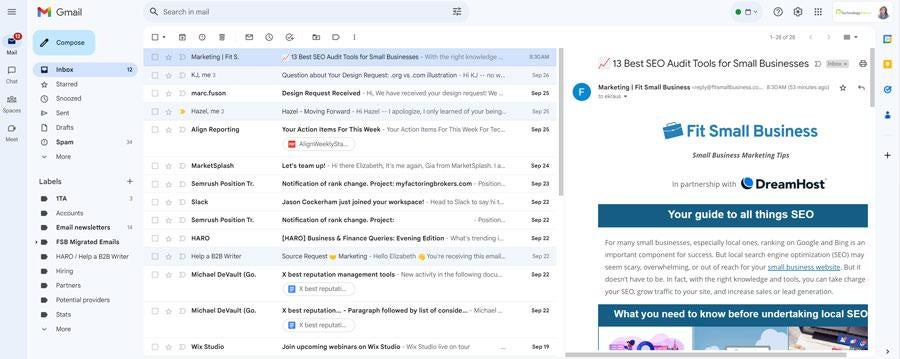
Another reason to choose Google Workspace is its ease of use. If you’re a complete beginner to email hosting, you can’t go wrong with Google Workspace. It’s super easy to set up and navigate and is overall one of the most user-friendly platforms around. You also get Google Meet for video conferencing and up to 5 TB of cloud storage on the highest plans. With Google Pay, you can even send and receive money internationally.
Google Workspace is our top business email provider overall, but it doesn’t have the same advanced features as its top competitor, Microsoft 365. However, it is far easier to use, and its features are usually more than enough. Another drawback is it doesn’t offer any free domains, meaning you’ll need to already have one or purchase one from a domain registrar.
Want to know more about the specific features Gmail provides to business email users? Check out our list of the top Gmail tips and tricks, or read our in-depth Gmail review on Fit Small Business
Google Workspace pricing
For most small businesses, the Starter plan will be all you ever need. But if you want to increase storage or video conferencing limits, upgrades are available.
Business Starter
Cost: $6/user/month
What’s included:
- Secure business email on your domain.
- 30 GB Google Drive storage.
- Security and management controls, including two-step verification.
- Google Docs, Sheets, Slides, Meet, Chat and Forms.
- Shared calendars and notes.
- Video calls with up to 100 participants, 24-hour meetings, digital whiteboarding and recordings.
- Website and survey builder.
- Google Payments.
- Automatic language translation.
- 24/7 support.
Business Standard
Cost: $12/user/month
Build on everything in the Starter plan with:
- 2 TB total storage.
- Shared team drives.
- Target audience sharing.
- Appointment booking pages.
- Video conferencing with up to 150 participants.
Business Plus
Cost: $18/user/month
Everything in the Starter and Standard plans, plus:
- 5 TB total storage.
- 500 participant video conferencing plus attendance tracking.
- eDiscovery and email retention.
- Enhanced security, including Vault, and advanced endpoint management.
Our expert opinion
Google Workspace’s plans are value-packed with communication, collaboration and productivity apps and are used by some of the biggest companies worldwide. Shared docs, spreadsheets, presentations, calendars and video conferencing make it the best email hosting service for small businesses, especially beginners. Learn more about how to set up Gmail for business email to get started.
Zoho Mail: Best for free and low-cost business emails

Expert score: 4.76 out of 5
Pros and cons
| Pros | Cons |
|---|---|
|
|
Who it’s best for
- Businesses and entrepreneurs on super-tight budgets needing a free email host.
- Startups and small operations looking for low-cost productivity and communications tools.
- Companies using and wanting to easily integrate other Zoho apps.
If budget constraints are your main concern, look no further than Zoho Mail. Though you’ll need to buy a domain name separately, it’s one of the best ways to get a free business email address. The free plan provides up to five email addresses, and the cheapest premium plan costs just $1 per month, like IONOS. However, Zoho Mail includes more storage in its free and base tier (5GB) compared to IONOS’ Basic plan (2GB).
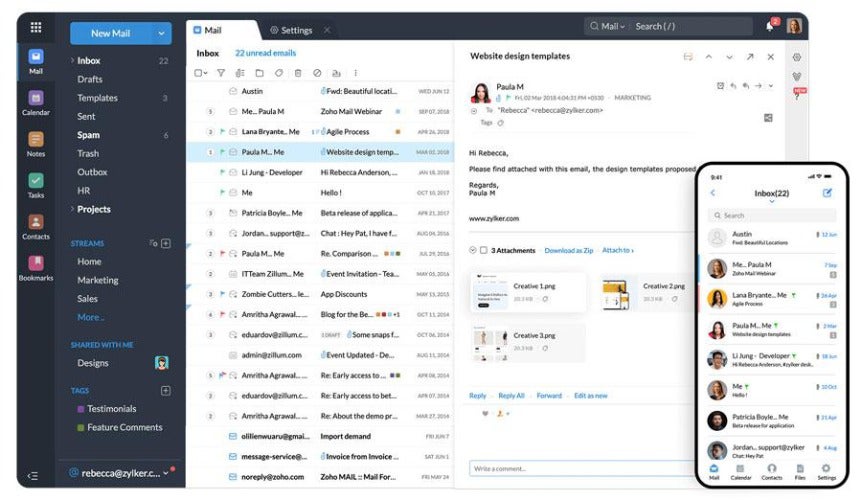
In addition to its low-cost plans, Zoho Mail is also recognized as one of the best business email providers for its team collaboration tools, which include shared calendars and appointment-booking. Overall, it’s our best alternative to Google Workspace and Microsoft 365 if you need a truly low-cost option (there’s even a free plan). None of its plans cost more than $4 per user per month.
Because the free plan has low attachment size limits and low storage limits overall, it’s best for those who don’t depend heavily on email but want a business email address to maintain a professional image. The biggest drawback of Zoho Mail is the interface isn’t as user-friendly — though, it can be worth it for the low price. Find out how to create free accounts on Zoho Mail.
Zoho Mail pricing
Zoho Mail is the go-to free business email if you own a domain. Entrepreneurs and small teams can create up to five custom email addresses completely free of charge. Then scale up with plans that add more storage, functionality and even a full suite of office productivity and communication tools similar to Google Workspace or Microsoft 365.
Free
Cost: $0
What’s included:
- Up to five free users.
- Five email addresses with 5 GB storage/inbox on a domain you own.
- 25 MB attachments.
- Webmail and mobile apps.
Mail Lite
Cost: $1/user/month for 5GB storage; $1.25/user/month for 10GB storage
What’s included:
- Email hosting for multiple domains.
- Email aliases.
- Shared calendars, emails and folders.
- Team collaboration tool.
- Tasks, notes and bookmarks.
- Up to 250 MB attachments.
- Mobile apps.
Mail Premium
Cost: $4/user/month
Everything in Mail Lite, plus:
- 50 GB storage.
- Up to 1 GB attachments.
- Email archiving and backups.
- White-labeled email hosting.
- Email encryption.
Workplace
Cost: $3/user/month
Everything in Mail Premium, plus:
- Online documents, spreadsheets and presentations.
- Instant messaging.
- Online meetings.
Our expert opinion
We recommend Zoho Mail as the best email for businesses on a budget. For less than $5 a month on any plan, you get a professional email address (even on the free plan), sizable attachment limits, plus shared calendars, emails and folders. You also get tasks, notes and team collaboration tools. If you’re looking for a low-cost alternative to Google or Microsoft, Zoho Mail is the best answer to your needs.
Hostinger: Best for all-in-one email and website hosting

Expert score: 4.65 out of 5
Pros and cons
| Pros | Cons |
|---|---|
|
|
Who it’s best for
- Businesses that want an all-in-one email hosting and website building solution.
- Entrepreneurs with multiple businesses wanting an affordable multi-domain hosting plan.
- Businesses that need multiple email inboxes under one domain.
Hostinger is one of our best business email hosting providers, but it isn’t solely for email hosting. It also has services for website hosting and building, making it our best all-in-one platform for hosting emails and websites. You can get both for as low as $2.99 a month on a two-year contract.
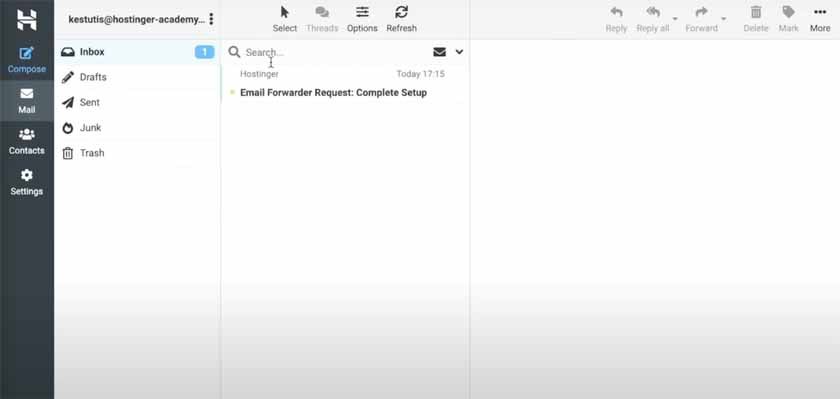
You can also get business email as a standalone for just $0.99 or $2.99 a month; however, these only get you 10 GB and 50 GB email storage, respectively. We recommend getting its all-around plans instead, which start at $2.99 monthly and let you create up to 100 email addresses and 100 websites on custom domains. Your emails also come with up to 50 email aliases and anti-spam and antivirus measures.
However, unlike other dedicated email hosts, Hostinger doesn’t have email encryption or anti-phishing measures, so it’s not the best in terms of security. If you want more security for your emails, go for a platform like Proton Mail or Google Workspace. Also, Hostinger only has up to 50 GB email storage at most, which is significantly lower than most others. However, for the value you get, it has one of the most cost-effective email plus website plans.
Hostinger pricing
Hostinger has some of the most cost-effective plans for email and website hosting, considering the value you get when you pair the two capabilities.
Premium (Website + Email)
Cost: $2.99/month on a two-year contract
What’s included:
- Up to 100 email inboxes with 1 GB storage each.
- Email anti-spam and antivirus.
- Up to 100 websites with basic ecommerce for 10 products and SSL security.
- Free domain.
- Weekly backups.
- 100 GB storage.
Business (Website + Email)
Cost: $3.99/month on a two-year contract
Everything in the Premium plan, plus:
- 200 GB storage.
- Content delivery network (for better website performance).
- Up to 100 products on your ecommerce store.
Business Starter (Standalone Email)
Cost: $0.99/month/mailbox on a two-year contract
What’s included:
- 10 GB storage.
- Up to 10 forwarding rules.
- Up to 50 email aliases.
- Antivirus and anti-spam.
Business Premium (Standalone Email)
Cost: $2.99/month/mailbox on a two-year contract
Everything in Business Starter, plus:
- 50 GB storage.
- Up to 50 forwarding rules.
Our expert opinion
If you need both an email and website host and want an all-in-one solution, Hostinger is your best bet. Your business email has all the essentials you need. And you can even build your website easily on the platform using its AI site builder and dozens of professional templates. Overall, if more value out of your dollar is what you’re after, Hostinger is one of the best low-cost, high-value business email providers.
Bluehost: Best for multiple email aliases

Expert score: 4.47 out of 5
Pros and cons
| Pros | Cons |
|---|---|
|
|
Who it’s best for
- Anyone who needs multiple email aliases.
- Small teams that manage multiple departments and email accounts.
- Sales or customer service teams that use shared calendars for appointment booking.
One of the best benefits of business email providers is the ability to have multiple email aliases leading to one shared inbox. For example, you can have support@yourbusiness.com and customerservice@yourbusiness.com all leading to the same inbox managed by the same team. The best business email service for this is Bluehost, as it allows up to 25 email aliases on the starting plan and up to 50 on the higher plan.
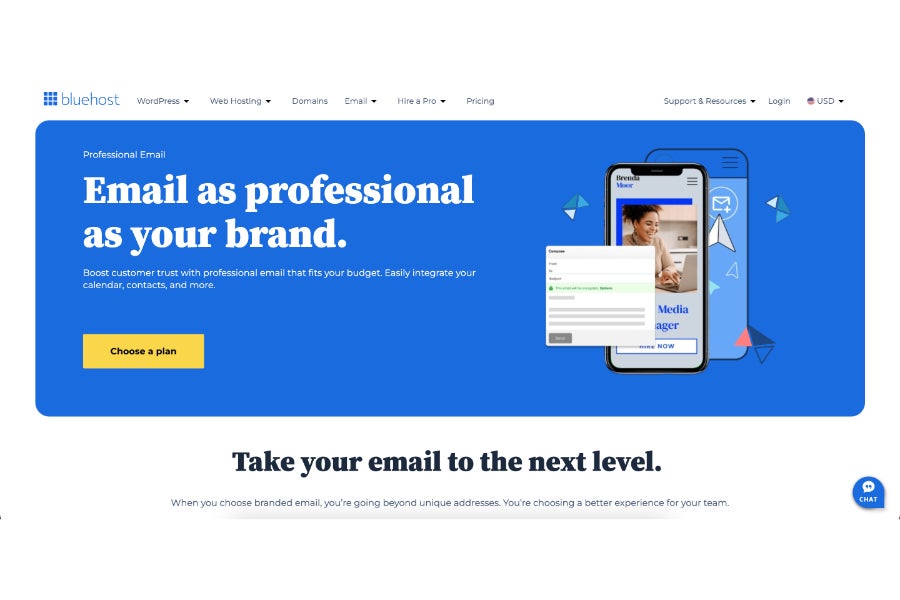
Along with email aliases, Bluehost also offers sizable storage (25 GB and 80 GB), along with documents and shared calendars, contacts and tasks, so it’s a worthy alternative to Google Workspace (albeit not as beginner-friendly). It also has spam filters and antivirus to protect your mails’ security. However, the drawback is there are no multi-user plans, so costs can run up quickly if you have multiple team members.
Professional Email
Cost: $14.99/year
What’s included:
- 25 GB storage.
- 25 email aliases.
- Mail filters.
- Spam filter, antivirus and anti-phishing.
- Shared calendar, tasks and contacts.
- Documents, spreadsheets and presentations.
- Email recall, forwarding and signing.
Professional Email Plus
Cost: $24.99/year
Everything in the Professional Email plan, plus:
- 80 GB storage.
- 50 email aliases.
- One-click email and file encryption.
Our expert opinion
Bluehost has long been one of the most reliable hosting services, whether for websites or emails. Its email productivity features are comparable to those of Google Workspace, making it one of the best business email providers overall, especially if multiple email aliases are important to your business. The slightly higher price tag can be well worth its many features. Find out how to set up Bluehost webmail.
ScalaHosting: Best for daily email backups

Expert score: 4.42 out of 5
Pros and cons
| Pros | Cons |
|---|---|
|
|
Who it’s best for
- Businesses that handle lots of important or sensitive data, like receipts, and need secure copies.
- Any business wanting automatic daily backups to protect data.
- Companies wanting a high level of security and spam email protection.
If having secure copies of your emails is important to your business, you’ll benefit most from an email host that provides daily backups of your emails. One of the best small business email providers for this is ScalaHosting. It’s the only one on this list that provides daily email backups—even up to seven daily—and you can restore them anytime from the CPanel. This makes it a good choice if you handle sensitive or important information via email.
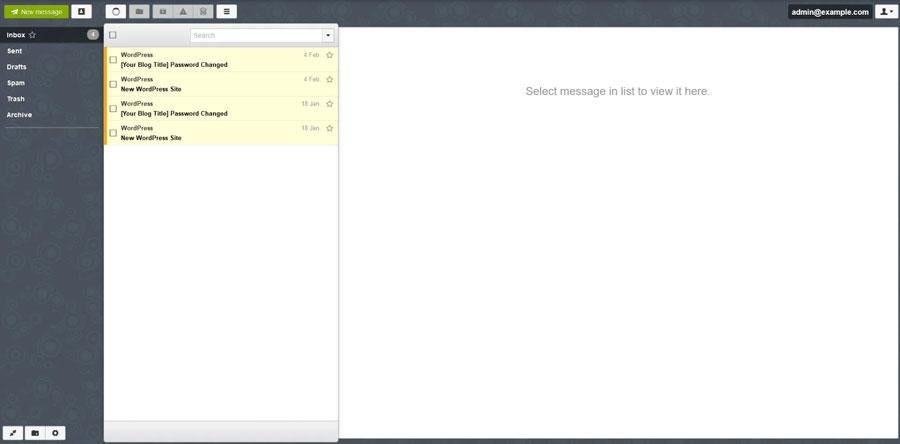
On the starting plan, you can create up to 10 email accounts under one domain, which automatically comes with seven daily backups to a remote server. However, the starting cost for this plan is $6.95 per month on a one-year contract or $4.95 on a three-year contract. Unfortunately, ScalaHosting only offers month-to-month contracts on its highest plan.
The highest tier also has the most advanced security features, including real-time malware protection and user controls. This tier also allows for custom branding and white labeling, which is great for resellers. It also includes blacklist monitoring, which is ideal for teams that rely on cold sales emailing for lead generation.
ScalaHosting pricing
ScalaHosting’s offers standalone business email services. But all its web hosting plans come with unlimited business emails and free SSL for data encryption (for domains hosted on its servers).
StartUp
Cost: $6.95/month; $4.95/month for a three-year contract
What’s included:
- Up to 10 email inboxes with 50 GB storage each.
- One email domain.
- Daily offsite backups.
- Web-based email access.
- Add to your preferred email app (POP3ⓘ/IMAPⓘ/SMTPⓘ).
- Advanced spam protection.
- Standard security and deliverability.
SmallBiz
Cost: $9.95/month; $6.95/month for a three-year contract
Get everything in StartUp, plus:
- Up to 50 email accounts, each with 100 GB storage.
- 5 email domains.
Medium
Cost: $14.95/month; $9.95/month for a three-year contract
Get everything in StartUp, plus:
- Up to 100 email accounts, each with 150 GB storage.
- 10 email domains.
Cloud
Cost: $34.95/month; $19.95/month for a one-year contract; $14.95/month for a three-year contract
What’s included:
- Unlimited email inboxes, each with 50 GB of fast SSD storage (upgradable).
- Unlimited email domains.
- One free domain name.
- 100% inbox deliverability.
- High security (dedicated, isolated cloud hosting environment).
- Shield real-time malware protection.
- Dedicated IP.
- Priority support.
- Blacklist monitoring.
- OpenLiteSpeed caching.
- Sub-users and collaborators.
- Branding and white label.
Our expert opinion
ScalaHosting may not be the cheapest email host, but it’s the best email provider for businesses that want or need secure backups of their emails (e.g., businesses that regularly exchange sensitive or relevant information via email that needs to be recorded). Plus, all its plans come with security and advanced anti-spam, so if security is a top priority, it’s also a good candidate.
IceWarp: Best for AI-powered business email

Expert score: 4.37 out of 5
Pros and cons
| Pros | Cons |
|---|---|
|
|
Who it’s best for
- Small business owners that need an AI assistant to help with their emails.
- Large teams that need lots of video conferencing and recording.
- Any business that needs email collaboration with an AI assistant.
If you’ve been online for the past few years, you may be well aware of the atmospheric growth of AI tools and how they can help businesses. That also goes for your business email. One of the best email providers for businesses at the forefront of this is IceWarp. It incorporates AI into nearly every aspect of your business email, from helping compose your messages to organizing tasks, at no additional cost.
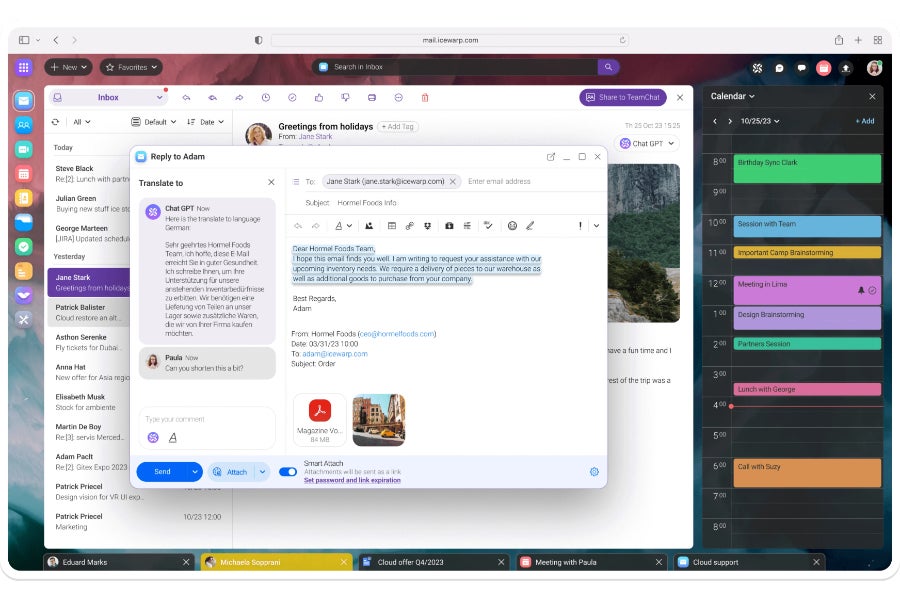
In particular, its AI tools are powered by ChatGPT, so you’re sure to get best-in-industry AI services. The AI assistant can also summarize lengthy emails, organize your appointments and do real-time translations, among other tasks. Aside from its AI tool, IceWarp’s other best points are its high storage (up to 200 GB email storage and 1 TB cloud storage) and video conferencing with unlimited recording.
However, because no AI tool is perfect, IceWarp’s best feature could also be its biggest drawback. AI tools — including ChatGPT — are a constant work in progress and may not always provide the best results, especially if you’re unsure how to use them. Another disadvantage is it has no daily backups. And its security is limited to anti-spam and antivirus, so it’s not the best if security is a top priority for your business.
IceWarp pricing
Startup
Cost: $35/month for 10 users
What’s included:
- Custom domain with 200 GB storage per mailbox.
- 1 TB cloud storage per user.
- Video conferencing for up to 1,000 participants and unlimited recording.
- ChatGPT-powered AI email assistant.
- Instant messaging with teams.
- Collaborative documents, spreadsheets and presentations.
- Calendars and notes.
- Email anti-spam and antivirus.
Business
Cost: $2.30/user/month for up to 500 users
Get everything in Startup, plus:
- Desktop suite for your email and apps.
Our expert opinion
IceWarp may not be as well-known as other email providers, but it has noteworthy features to offer, including high storage limits, substantial video conferencing and all the essentials, at affordable pricing. Most of all, it’s the best email service for small businesses that want to explore AI or just want an AI assistant to help with email tasks. You’ll also get collaborative documents, calendars, and anti-spam and antivirus.
IONOS: Best for email hosting with a free domain

Expert score: 4.36 out of 5
Pros and cons
| Pros | Cons |
|---|---|
|
|
Who it’s best for
- Anyone wanting to get an email host free email domain.
- Entrepreneurs, freelancers and small businesses on a budget needing cheap email hosting.
- Startups looking to build brand presence with affordable bundled solutions with email, web hosting, a domain and SSL.
IONOS is one of Europe’s leading web hosting companies and domain registrars, and it’s especially helpful for getting business email with a free domain at low costs — starting at just $1 a month. Your domain can include extensions like .com, .us, .online and .net. Your plan also gets you 2 GB mailbox storage (approximately 10,000 emails). If you need more storage, you can upgrade anytime.
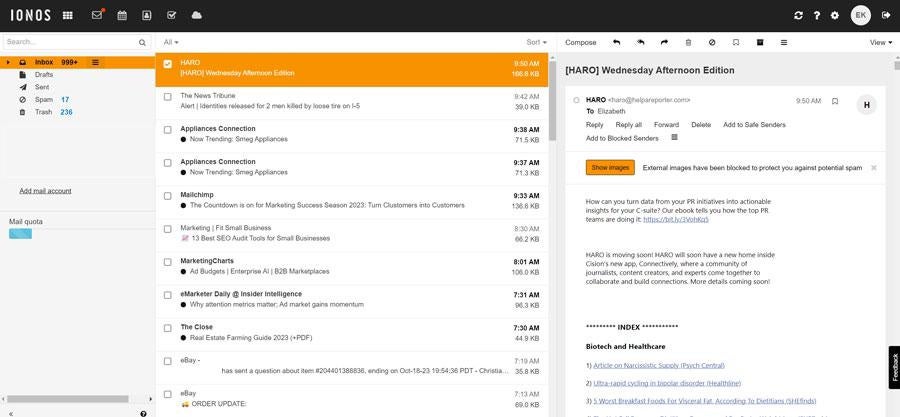
Another thing we like about IONOS is it’s long been well-regarded for its security measures. On any plan, you get antivirus and anti-spam measures. And on the highest plan, at just $5 a month, you get premium protection. In addition to its security, IONOS also has round-the-clock support. After submitting a ticket, a customer service rep will contact you directly to help troubleshoot any issue.
The biggest drawback with IONOS is it doesn’t offer any team collaboration or content creation tools like shared documents or spreadsheets, unlike Google Workspace or Zoho Mail. it’s solely a business email provider with a free domain, so it’s only best if email is what you’re solely after.
IONOS pricing
IONOS offers individual and multi-user plans for up to five or 10 users. Or add email to any of its website builder, domain registration or web hosting plans.
Basic 1
Cost: $1/month
What’s included:
- 2 GB storage (add mailboxes and extra storage at any time).
- Free domain and SSL.
- Ad-free email.
- Spam filter.
- Webmail with calendar, tasks and more.
- Cross-device syncing.
- 24/7 support.
Basic 1+
Cost: $4 per month
Everything in the Basic plan, plus:
- 12 GB storage (expandable).
Business
Cost: $5/month for one user; $15/month for 2-5 users; $25/month for 6-10 users
Everything Basic one and 1+ users get, plus:
- 50 GB storage per user.
- Premium virus protection and spam filter.
- Team collaboration tools (shared calendar, contacts and tasks).
Our expert opinion
Although IONOS’s email hosting plans lack tools like video conferencing, at $1 or $5 per month, you’ll be hard-pressed to find a better (or cheaper) business email provider with a free domain. If you’re looking for a solid, secure and reliable host to set up your business emails on and don’t need extra content or productivity tools, IONOS is one of your best options.
Proton Mail: Best for advanced email security

Expert score: 4.16 out of 5
Pros and cons
| Pros | Cons |
|---|---|
|
|
Who it’s best for
- Businesses handling highly confidential or sensitive contracts and information via email (like law or healthcare firms).
- Organizations needing HIPAA-compliant email hosting with end-to-end data encryption.
- Companies doing business overseas that need to comply with GDPR rules.
- Entrepreneurs who want to use anonymous email aliases to protect their identity and prevent spam and phishing.
If your email’s security is your number one concern, Proton Mail is the world leader in email security and privacy. All plans, including the free version, include end-to-end encryption, making it ideal for any business that’s handling sensitive information via email or wants advanced security. It can be especially well-suited for healthcare providers, legal firms or similar organizations that regularly handle highly confidential or sensitive data.
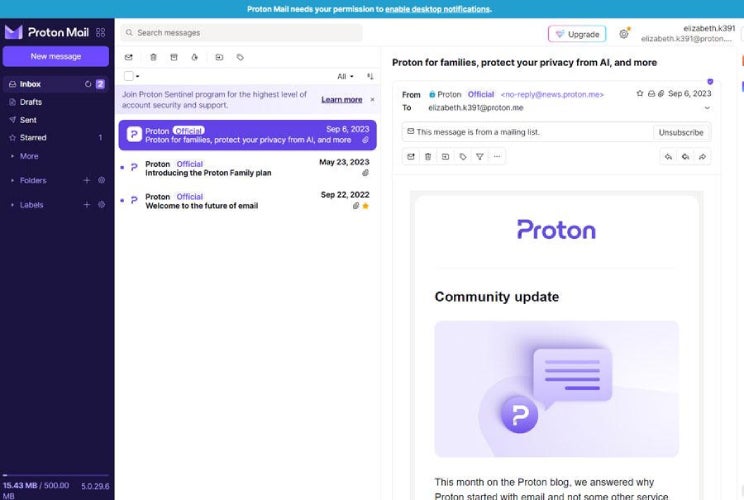
In addition, Proton Mail security complies with GDPR agreements. Keep in mind that to ensure compliance, you’ll still need to get a signed agreement to fully protect your organization. It also has substantial storage, especially on the highest Proton Family plan, which offers up to 1 TB of storage and up to six users. Proton Mail even has its own calendar, VPN and cloud storage (like Google Drive).
The negative side of Proton Mail is none of its plans offer a free domain, which means you’ll need to have your own domain first or purchase one separately from a domain registrar. It also doesn’t have the same kind of productivity tools Google Workspace or Microsoft 365 offers. However, for the value you get, it’s one of the best email providers for small businesses.
Proton Mail pricing
Proton Mail includes individual business email accounts perfect for freelancers and entrepreneurs and easy-to-manage business plans billed on a per-user basis.
Free
Cost: $0 (forever)
What’s included:
- Email hosted on a Proton Mail subdomain.
- 1 GB storage.
- 150 emails a day.
- One calendar.
- Auto-device syncing.
- Encrypted file sharing.
- One medium-speed VPN connection.
Mail Plus
Cost: $3.99/month (billed annually); $3.49 with a two-year contract; $4.99/month (billed monthly)
What’s included:
- Email hosted on a domain you own.
- 15 GB storage.
- 10 email addresses.
- Unlimited messages.
- 25 MB attachments.
- 20 shareable calendars.
- Auto-device syncing.
- Encrypted file sharing.
- One medium-speed VPN connection.
Proton Unlimited
Cost: $9.99/month (billed annually); $7.99 on a two-year contract; $12.99/month (billed monthly)
Everything in the Mail Essentials plan, plus:
- Support for 10 email domains.
- 15 email addresses and 500GB storage/user.
- Unlimited “Hide My Emails” aliases.
- 10 high-speed VPN connections/user.
- NetShield malware and ad-blocker.
- Secure core servers.
- VPN for up to 10 devices.
- Digital encrypted vault (Proton Pass).
- Online calendar and storage.
- P2P/BitTorrent.
- Worldwide streaming services & highest VPN speed.
Proton Family
Cost: $23.99/month (billed annually); $19.99/month on a two-year contract; $29.99/month (billed monthly)
Everything in the Proton Unlimited plan, plus:
- Up to six users.
- 3 TB storage.
- 90 email addresses.
- Three custom email domains.
- VPN for 60 devices.
Our expert opinion
If your organization needs the most private, secure business email provider on the market, Proton Mail’s business plans are hard to beat. As one of the few providers that can ensure both HIPAA and GDPR-compliant business email services, it is ideal for businesses that value security or have customers in EU member countries. There’s also a free plan to get started, making it one of the most cost-effective platforms overall.
InMotion Hosting: Best for guaranteed uptime on your emails

Expert score: 4.12 out of 5
Pros and cons
| Pros | Cons |
|---|---|
|
|
Who it’s best for
- Organizations needing to ensure the highest possible uptime, like companies in finance, healthcare and emergency services.
- Small businesses looking for zero-downtime migration solutions and domain and email transfers.
- Anyone looking for an all-in-one email and website host with enterprise-level security.
InMotion Hosting offers just about the highest uptime guarantees available: 99.99%. In addition, it provides zero-downtime migration and transfer services, which is invaluable for ensuring you’re always available whenever customers need to reach you. Furthermore, its in-house technology stack, UltraStack, processes data faster than regular email data processors — up to 20 times faster on the highest plan.
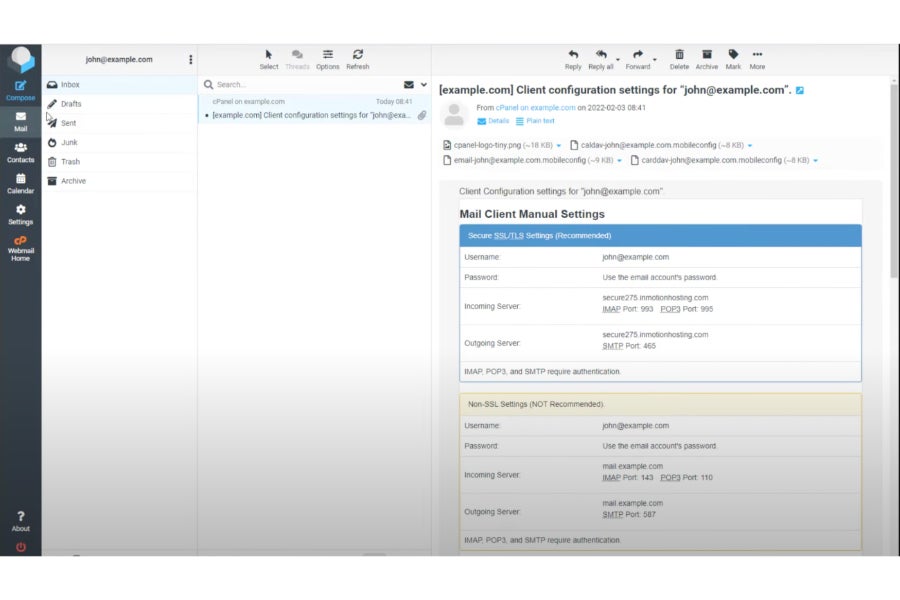
Aside from its uptime and data processing, InMotion can also host websites, so it’s a good option if you want an all-in-one server for your websites and emails. It has a website builder, but it’s not as intuitive as Hostinger’s. Outside of web hosting, it offers advanced security and a built-in marketing suite with advertising credits and customer service tools.
On the downside, there’s no standalone email hosting plan, unlike Bluehost, IONOS and Hostinger. It doesn’t have productivity or team collaboration tools either, and it’s not as easy to navigate as tools like Gmail or Proton Mail. But the advantages of increased speed and a near-perfect uptime guarantee could be more than worth it.
InMotion Hosting pricing
InMotion Hosting plans include a basic plan with up to 10 email inboxes or unlimited email accounts in all plans after that. You can also purchase automatic backups, Google Workspace and dedicated IP addresses as add-ons.
Core
Cost: $2.99/month (billed annually); $2.69 on a three-year contract; $12.99/month (billed monthly)
What’s included:
- Free domain and SSL.
- 10 email addresses, 1 GB storage each.
- Two websites.
- 100 GB SSD storage.
- Unlimited bandwidth.
- 2x speed & performance.
- Hack, malware and DDoS protection.
- BoldGrid WordPress website builder.
- 24/7 US-based live chat support.
- One-click installation for WordPress and hundreds of other apps.
- 90-day money-back guarantee.
Launch
Cost: $4.79/month (billed annually); $3.99 on a three-year contract; $15.99/month (billed monthly)
Get everything in the Core plan, plus:
- Unlimited business email accounts, 5 GB storage each.
- Unlimited websites.
- Unlimited NVMe SSD storage.
- Unlimited bandwidth.
- 6x UltraStack speed & performance.
Power
Cost: $4.79/month (billed annually); $3.99 on a three-year contract; $15.99/month (billed monthly))
Everything in the Core and Launch plans, plus:
- 10 GB of email storage per inbox.
- 12x UltraStack speed & performance.
- Advanced caching.
- 24/7 live chat and phone support.
- Ecommerce-ready WordPress hosting.
Pro
Cost: $10.79/month (billed annually); $9.49/month on a three-year contract; $19.99/month (billed monthly)
Everything in Core, Launch and Power, plus:
- 20 GB of email storage per inbox.
- 20x UltraStack speed & performance.
- Dedicated IP.
Our expert opinion
While InMotion isn’t a standalone email host, it provides the best email hosting for businesses that want the highest guaranteed uptime, especially if they also have a website. Prices are comparable to other standalone email hosts but also come with website hosting and building, faster-than-average data processing and enterprise-level security. It’s an all-around good option with few negatives.
How we evaluated the best business email providers
All businesses need email that can be accessed quickly, securely and reliably, with enough storage to keep messages from bouncing. However, solopreneurs may only need a single email address, while growing companies need scalable solutions. Because of these, we looked at options that can serve anyone, from sole proprietors to businesses with multiple employees, agencies and resellers.
Pricing: 25%
Cost is a driving factor for most small businesses. Therefore, affordability, the ability to pay monthly vs annually, the availability of standalone email plans and all-in-one cost-saving bundles all factored into our ratings.
General features: 20%
General features speak not only to the essentials that business email users need (like adequate storage, multi-user plans, and data, spam, and virus protection) but also to the overall product value vs cost.
Niche features: 20%
Niche features include built-in AI writers (look for more email apps to have this soon). We also looked at end-to-end encryption for HIPAA and GDPR compliance, private domain registration and built-in communication tools for chat or video (and any other software that comes with the plan).
Support: 10%
The platforms above were also rated by the quantity and quality of self-help resources available to users and the level of customer support available to help with setup, troubleshooting and account management.
Expert score: 25%
Regardless of how a provider scores on paper, how it works in the real world is a key factor. We personally tested each of these providers and evaluated the proficiency of their features for small businesses.
5 things to consider when choosing an email host
When comparing business email providers, consider factors such as other services your company may need now or in the future. Also, compare the uptime and inclusions of providers to be sure you’re getting a reliable partner for business emails.
- Your priorities: Your priorities should always be the number one consideration when choosing the best email host for your business. Do you prioritize security, ease of use or affordability? Each provider has its own set of features and benefits that may or may not be the best fit for your business.
- Extra features: The best business email providers can also provide features like productivity and team collaboration tools that can help your business substantially. Take note of other features you may need to help you select the best provider for your business.
- Previous reviews: Most email hosting services have customer reviews published on major tech review sites. But sites like Reddit are also good places to research tech companies and get takes from real customers about which service is best or which to avoid. Taking the time to check customer sentiment and reliability can save you productivity and revenue.
- Scalability: As your business grows, will your email provider accommodate the additional accounts, storage and features your team will need? What about future plans? For instance, you may not need a website now, but you may in the future, and hosting it on the same provider as your email will be more convenient.
- Cost: No small business’s marketing budget is the same. Aside from evaluating whether your email host fits in your budget, consider whether you’re getting enough features and benefits out of your plan and if your provider’s pricing scheme is sustainable.
SEE: Feature Comparison: Email Marketing Software and Services from TechRepublic Premium
Frequently asked questions (FAQs)
What is the best email to use for a business?
The best overall email host for small businesses is Google Workspace. It’s the easiest platform to use, is trusted by big and small businesses and comes with productivity and team collaboration tools — all at affordable pricing. If you’re new to business email, Google Workspace is the email host we recommend. Some other good platforms to consider are Microsoft 365 for advanced tools and Zoho Mail for affordable (and free) plans.
What emails do most businesses use?
Most businesses use Google Workspace (Gmail) or Microsoft 365 (Outlook). These are the two leading email providers in the world, have secure email hosting and come with built-in productivity, video conferencing and team collaboration tools on custom email domains.
Is Gmail or Outlook better for businesses?
For a completely beginner-friendly solution, Gmail (aka Google Workspace) is the better option. Meanwhile, if you want more advanced productivity tools like automated workflows, Microsoft 365 (Outlook) is a better fit. Google Workspace is also better-suited to longtime Google users, and vice versa for Microsoft 365. Google allows for automatic syncing of your work (unlike Microsoft), while Microsoft has higher attachment and video conferencing limits.
Bottom line
A professional email for your business is a must-have if you want to build your long-term brand credibility. The good news is that with many of the best business email providers available, your business email also comes with dozens of handy features like productivity suites, security and even website building. We recommend Google Workspace as the best all-around solution for its email capabilities, ample storage and productivity tools.